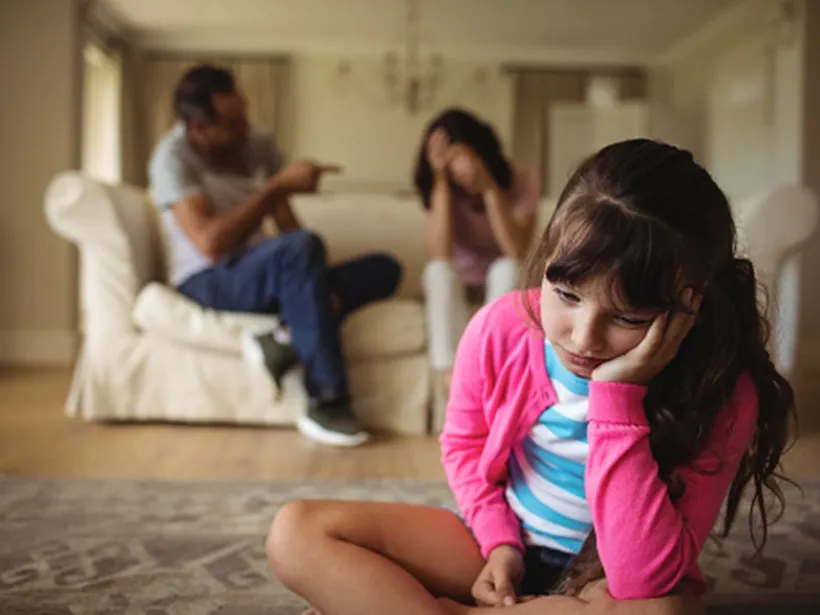Domestic disputes can affect a child’s personality and hamper their present and future social interactions.
By Vihan Sanyal
A home is a child’s refuge of love and care. Children need to feel loved, secure and comfortable to express themselves fully. If children see parents constantly fighting and arguing at home, it creates a sensation of panic within the child. They feel frightened and helpless. These feelings of vulnerability and insecurity can shape a child’s personality and last a lifetime.
How do children respond when their parents fight?
1. Children often become quiet and freeze seeing their parents fight. They become confused because they don’t know how to react to the situation.
2. Toddlers and older children start to cry when they see their parents fight.
3. Children feel scared, vulnerable and insecure when they are subjected to heated arguments.
4. Children often mimic their parent’s behaviour during playtime, at school or when they are with their siblings and friends. This can also result in them turning into bullies and feel comforted by inflicting pain and torture on other children.
5. Some children harm themselves physically. They tend to also behave in a cruel manner towards insects and animals to try and cope with their emotional pain.
6. Children often behave aggressively and throw temper tantrums back at their parents or on others.
7. Children often blame themselves as the reason for their parents’ fight.
8. Older children think of running away from home. Some prefer to stay at school longer and don’t look forward to going home.


How do parents’ arguments affect children’s mental health?
Children, who come from dysfunctional families and are victims of domestic abuse, show the following signs:
Social & Behavioural Problems
Children subconsciously assimilate and tend to behave in similar ways to their parents. Their demeanor and attitude towards life can become majorly impacted by domestic disputes. It often forms a part of the child’s personality and can hamper all of their present and future social interactions. Children who grow up in abusive environments often develop behavioural issues. They are likely to become compulsive liars, steal things, vandalise property (including their toys) and use abusive language. They may behave recklessly (get into trouble for their behaviour at school and/or with the law). They may become loud and obnoxious or quiet and withdrawn.
Mental & Emotional Problems
Studies have shown that children who come from dysfunctional homes are at a higher risk of developing mental disorders like Attention Deficit Hyperactivity Disorder (ADHD), Anxiety, Depression, Obsessive-Compulsive Disorder (OCD). As children’s minds lack coping mechanisms to effectively cope with fights at home, they tend to become more susceptible towards developing mental disorders.
Relationship Problems
Children who grow up in a hostile environment tend to experience difficulties in forming and sustaining relationships. They tend to face problems in almost every other relationship, whether its friends, romantic associations, at work and with strangers they wish to interact with.
Eating Disorders
It is not uncommon to find eating disorders in children who are witness to ongoing abuse at home. Either children tend to binge eat and become obese or reduce intake of food and become anorexic. Eating disorders can result in permanent physiological complications in a child’s growth and future health.
Substance Use & Abuse
Children who belong to volatile households are at a higher risk of using and abusing substance. They can soon become addicted to substances like alcohol, tobacco, marijuana and other forms of drugs.
Academic Performance
A child’s mind is usually preoccupied with the tensed home environment. This makes it challenging for them to concentrate on academic studies at school.Most children become below average performers in their academic records. Emotional stress can adversely affect children and they may tend to fall physically ill frequently. Our immune system is compromised during stressful events and this can result in a child contracting frequent allergies, viral and bacterial infections. This can result in time off from school which can make it even more difficult for the children to do well at school.
What parents need to do
1. Never fight in front of your children
2. Respect each other in front of your children. Always respect your spouse. Never belittle each other in front of your children
3. Don’t create a situation which would require your child to take sides
4. Be mindful of the language and tone you use with each other
5. Talk to children about arguments and differences in opinions. Show them how to responsible adults resolve conflicts
6. Don’t involve your children when you are arguing with each other. Don’t make it about them
7. If you do happen to fight in front of your children, then ensure to resolve the fight in front of them too
8. Keep ego out of the argument and never play the blame game. Where there is genuine love and care, there is no room for ego!
We are all products of our parenting. We tend to instinctively behave like our parents when we become parents ourselves. Let us become aware of this pattern in our behaviour. Rearing children is no child play, it requires patience, self control, perseverance and tenacity. Unsupportive and insensitive parenting can result in long term damage which can infect generations to come. We can break the cycle and parent our children empathetically.
(The writer is a psychotherapist.)
Source: Read Full Article





